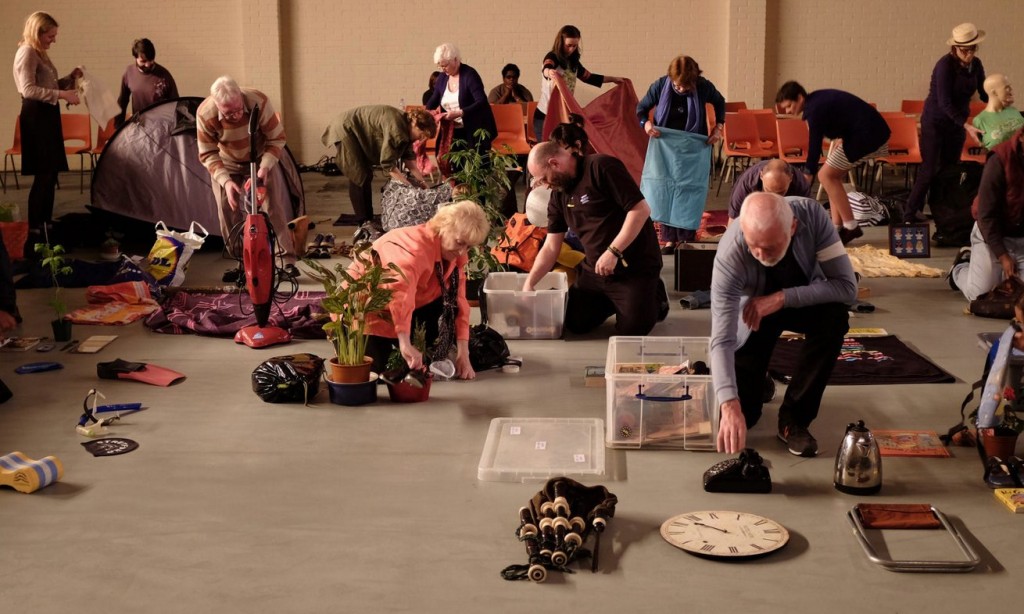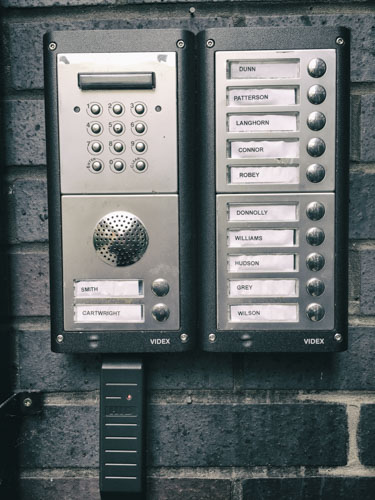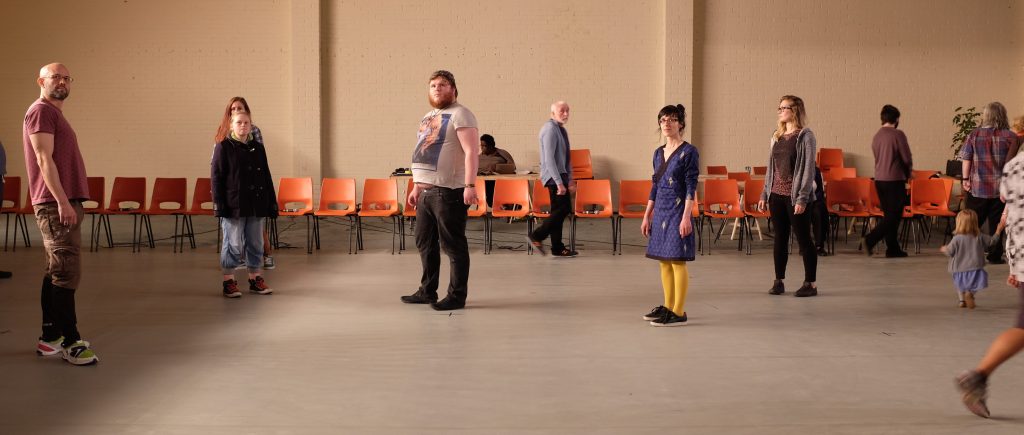‘Objects of every sort are materials for the new art: paint, chairs, food, electric and neon lights, smoke, water, old socks, a dog, movies, a thousand other thing that will be discovered by the present generation of artists. Not only will these bold creators show us, as if for the first time, the world we have always had about us but ignored, but they will disclose entirely unheard-of happenings and events.’
– Allan Kaprow (The Legacy of Jackson Pollock)
This is not the first Summer.
Back in 2014 Quarantine made the first iteration of Summer in a warehouse near Islington Mill. A group of people from many walks of life walked into a rehearsal room, shared food, thoughts and quite a bit of themselves. During the course of making, different things were tried out: exercises, experiments, provocative questions and strange instructions. Some must have resonated (‘cause they are still in the show that’s being made now), others became starting points or ghostly after-images. Glimpsed only if you know where to look and lived the context.
In the old warehouse, there were few traces of what had occupied the space before. By contrast, this space is an onion-skin world of fragments. The theatre (our theatre) is inside a studio, the studio is a sound stage (was a sound stage), outside the sound stage is a street that isn’t a street (and on the other side is a street that is a street). Underneath the dance floor that is our stage, there are different patterns made to be different places. There is the floor that was the Rovers, marked and worn from hundreds of bar-tending steps. There is a pattern that looks like it might have been a kitchen or a shop. There are no walls. Where the bar is now, was apparently once Underworld. Affectionately known as the knicker factory (affectionately by our crew, I don’t know enough about Corrie to know what it’s called in that world). The map is the same size as the territory, although with a wildly different periphery – a hinterland of control rooms, dressing rooms and office space.
If you align your eyes with a particular camera angle a new setting might appear, like one of those magic eye pictures, or a sculpture that when it rotates resolves into the Channel 4 logo. Move, and it collapses, becomes faded marks on a floor, some intercom buttons that ring no bells, or a set of bins outside the back of a building (yes they are bins, but they’re also prop bins, is all the rubbish real?). These are outlines of tracing paper plans, overlaid until they are simply a jumble of accidental shapes. A map so heavily marked with journeys, notes and possibilities it’s no longer possible to decipher where it is.
It’s a space that’s been many places. Now, somehow, it’s our place. A place we inhabit for a short while, an everyday place, one where our individual paths in space and time collide. In this palace of make believe our backdrop is each other, a selection of chairs and tables, some cups and bottles of water, pens, balloons, cardboard signs, microphones, lights and occasionally some tantalising text on the screen above. Towards the end we’ll bring out our props. Objects selected from a list of categories long enough to mean no one person could have picked one of every type, yet deliberately incomplete – urging surprise (a manikin, a hoover, a tent). Whilst we rearrange them, we’ll try to make sense, as you will.
Both from the stage and from the seats – gravitas and significance is mashed up with accidental juxtaposition and misaligned farce. Between us we create meaning: what is this to you?
It all depends on your point of view.
– Kenneth Gergen (Relational Beings)
The company describe this work (and the Quartet that it begins) as ‘a piece of mass portraiture’. In what might be described as a traditional portrait – all gilt frame and brush-strokes – an artist orients the subject in a particular pose. The background (and other props) provide this context, and between them tell that story. For the spectator, meaning is forged in a moment of looking: a little reflection, and some unconscious bias might add to a well-travelled narrative. You move on, the picture remains (and will be there when you return).
Here, the portraits talk back, and their unlikely answers might puncture a preconceived idea, challenge a foregone conclusion or reinforce an attitude. These are fractal portraits. In every movement or word a tiny fragment of someone is revealed, at the same time exposing a glimpse of the iceberg mass of their past, their present and everything that took them from their beginning to now, to standing here, on this stage, looking back at you.
This is time travelling 3d portraiture, a randomised sequence of continuous, generous and temporary tableaux vivant, (or that bit in Donnie Darko where the main character’s future visibly bursts from his belly and traces a path through space).
And there are moments where our roles slip, between your spectatorship of us and our opportunity to look at you. There’s always enough light to see the audience from the stage, and sometimes in the stillness these portraits look back. Not as a vicious disruption, this is comfortable, almost. A kind of re-balancing act, in which the viewer and the viewed are somehow, briefly, equalised. It’s a beckoning stance, an invitation to be a part of a fleeting community. To zoom out, to extend the map.
The group on stage for this run is made up of some folks from the first Summer and others who are entirely new to the project. A temporary but coherent family. Quite astonishing is the speed with which this group coalesced. Those returning from the old Summer aren’t old lags or veterans, folks who’ve just come in aren’t newbies or neophytes. The continual shift of conversation, fertilised with countless questions, a freedom to interpret instructions and ask questions back – not to mention the extended family supper we share every time we meet – makes for a safe and inquisitive space. Long lost aunts and cousins embraced in a communal dance.
‘Theatre can be what we want and need it to be in order to meet audiences and look them straight in the eyes with a question and an attempt to talk about what it’s like to live in this world now.’
– Tim Etchells (Programme Notes)
A thread that runs through the quartet is that of the asking and answering of questions. During Summer’s rehearsal process, disarmingly snuck in whilst the performers are tucking into a splendid tea, pieces of paper marked with questions are found on the table. What’s the strangest thing you’ve ever eaten? What’s your favourite karaoke song? Where is the furthest place from here you’ve ever visited? What’s the point?
There are no wrong answers, we’re told.
This process normalises and accelerates the discovery process of conversation. It helps build nascent friendships, and feeds curiosity. It brings nuance and agency to disclosure, and helps us share experiences. At a TEDx talk in 2014, teacher and author Antony Lishak described the most common fear amongst primary school children was of getting the answers wrong. This extends to us all in a tick-boxed world, where you and your Uber drive rate each other against arbitrary standards, we are encouraged to judge every purchase, every transaction, and those primary school children are chided for not knowing grammatical constructs their parents would struggle with.
The environment generated by the people of Summer calmly and beautifully disrupts this process, allows us to dip out of a world of harsh binaries, to let go of certainties and embrace the sublime vastness of each other’s experience.
Are you a member of a group?
Yes. This one.
One dinner time a small group of us talk about performance. Someone had read the programme where it described us Summer folk as ‘performers’ and thought that this was suddenly perplexing, an unusual additional pressure. Is what we do performance? Instructed and questioned, moving about a stage, talking in front of an audience. What is performance?
So let’s do the basics one more time. What are the rules of theatre?
Some people do something. The others watch, listen, try to be there.
Anything else we need to know?
Not really, no.
– Tim Etchells
We perform ourselves, any theorist can tell you, we play a different role in front of the bank manager and the Aldi cashier, show a different side to our grandmother, best friend, lover or that bloke in front of you in the queue.
We’re a different person in front of an audience.
Yet, from strong foundations, and a generous heart, this work – this labour of Summer – allows us to perform a version of ourselves for you that’s a little bit more intimate, a little bit more revealing and perhaps a little better than we think. Embracing nuance and complexity, finding ourselves in amongst the similarly intricate lives of family, friends and strangers, there are no simple answers and that’s ok.
‘The whole thing exudes warmth, and a valuably impolite yet delicate and searching curiosity about what it is that makes us human. Tonight and tomorrow the show will be different. Because that’s how life is…’
– Lyn Gardner, The Guardian on Summer. June 2014
– Jason Crouch, Summer. performer
(from Jason’s blog: hohum.org )



